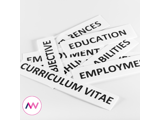Why choose us?
Our site is a goldmine of information and support. So, whether you're an employer or a candidate, why not pop over to our advice section to help you get the most from the recruitment process.

How To Get The Most Out Of Your CV
Page Overview:
At Aaron Wallis Sales Recruitment, we guide you to transform your CV from a static document into a powerful, strategic tool that opens doors. In this section, you'll discover how to optimise your CV for visibility, using clear structure and formatting, prioritise key achievements over tasks, and tailor your profile to the exact role you're targeting. From leveraging industry-relevant keywords for ATS recognition to showcasing impact numerically and aligning your presentation with employer expectations, this advice ensures your CV not only stands out but also drives action from recruiters and hiring managers.
Create Your Perfect CV
Create a standout CV in minutes using our free AI-powered Aaron Wallis CV Builder. Enter your details once and get a polished, professional CV ready to impress employers.
Employers do not have the luxury of time to read your entire CV, so maximising the value of what they do read is important in getting to the next stage of the recruitment process. Picking the correct information to emphasise and include on your CV can be the difference between securing an interview and getting your application thrown in the bin.
The key questions to ask yourself are:
- "What is my employer looking for?"
- "How can I show them that I am the right person for the job?"
- "What should I include or leave out in my CV?"
The most important thing to do is to personalise your CV in a way that reflects what the potential employer is looking for and what the role requires.
Research
Firstly, researching the role and organisation you are applying for is crucial to maximise the effectiveness of your CV. By looking at the skills and qualities required in the job description you have applied for, you can determine which elements of your experiences and characteristics you want your employer to read. Secondly, by researching the organisation or business that has the vacancy, you can gain insight into their operations and identify how your skills and experience can contribute to the role. This initial research is essential in producing a CV that fits the role you are applying to and gives you the best chance of being successful in your application.
'Dressing up' your CV
The next thing to do is to 'dress' the aspects of your CV in a way that is attractive to the employer, based on the research you have just done. Job descriptions often list the qualities they are looking for in a candidate, and using these characteristics as keywords in your application can be a helpful tool. If applying for a role which is looking for candidates with organisational skills, a good strategy is to include the keyword organisation in the section describing your skills. Often, employers use artificial intelligence to identify strong applications by looking for buzz or keywords, so picking the words you use in your application is very important.
Personalisation to the role and organisation you are applying for needs to be carried out throughout your CV. Although the 'Hobbies and Interests' section of your CV may be commonly overlooked, it is still worth the time to tailor this section to a specific employer. This may involve portraying an interest in travelling for jobs with international aspects, or demonstrating experience in extracurricular roles with responsibility in a group or society to suggest organisational or management skills.
Evidence
Providing evidence that you have the qualities and characteristics required for the vacancy is vital in a strong application. For example, if the role you are applying for is a management position, it is worth showing and indicating that you have strong leadership skills. The way to do this is to phrase your past experience in a way that portrays this. It may be impossible to change the facts of your previous employment, but highlighting elements of the role that suggest leadership experience can provide evidence of your management skills. Proof of your attributes is important in all types of job applications, and don't be afraid to include the specifics of what you have achieved or done in the past.
Graduates?
For graduates, it may also be worth remembering that it is not always the specifics you have studied in your degree that matter, but the skills you have acquired in the process. Depending on the role, you may want to think about how you portray what you have done during your time at university. For example, if applying for a role with organisational or operational duties, it may be worth highlighting the development of critical thinking skills when undertaking your degree.
The key to a successful application is matching your CV to what the employer is looking for and portraying yourself as an attractive candidate.
Date published: 3rd August 2025

Search jobs
With hundreds of jobs available, now is the time to look for your perfect position

by Sophie Jones
Associate Director

About the author
Sophie Jones
Sophie is an Associate Director at Aaron Wallis, and her main focus is to help clients find the best sales talent while ensuring that candidates secure the best professional fit. Sophie doesn't just fill vacancies; she strives to understand her clients' business goals, and she identifies candidates who will not only excel in the role but also contribute to the company's long-term success. Maintaining open communication is crucial, and Sophie ensures that clients are well-informed throughout the recruitment process, addressing any concerns and ensuring that expectations are met. She's a trusted advisor, and her ability to build bridges, solve problems, and advocate for success makes her an invaluable asset in the World of sales recruitment.
Please call us to discuss your next move
From our blog
Our employers say...
Our candidates say...

